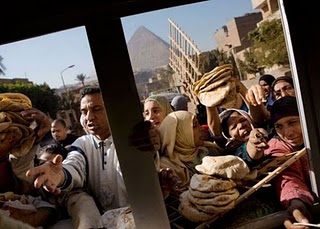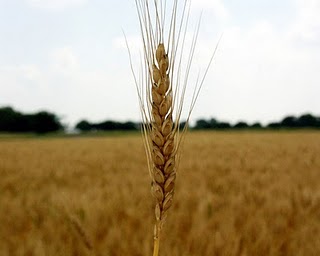Will Ethanol Break the Muslim World After All?
By Daniel Greenfield
SultanKnish.Blogspot.com
Ethanol has proven to be an inadequate solution to the problem of foreign oil, but it has toppled at least one Arab ruler and may not be done yet. The Soros backed college students and the Islamists have done their part in the protests, but the Tunisian and Egyptian mobs would never have made their showing without a goad. And the goad was high wheat prices. Part of the spike in wheat prices was due to the shift to ethanol production.
Remember when Americans were lining up with cans of gasoline during the OPEC oil boycott? Arab Muslims are now in the same boat, except with bread, rather than oil. Arab countries are frantically buying wheat, especially after the events in Tunisia and Egypt. Regime stability in the Middle East is now tethered to wheat prices. The Arab has prided itself on the power to pressure America using the price of oil, but the United States has now proven that it can do the same thing to the Arab world with the price of wheat. The price of oil may be climbing in America, but in Saudi Arabia the price of wheat is up by more than half.
The Arab-American relationship was built on a power inequity. They had a resource that we needed. But now we have a resource that they need even more badly. While you can do a lot of things with oil, you can't eat it. And while Americans may get angry when oil prices go up, unlike the Arabs, we don't overthrow the government. Of course anyone can grow wheat. China and India are the world leaders in wheat production. Behind them, Russia, America, Australia and Canada. But Russia has just stopped exporting grain. China uses most of its wheat domestically too but is ramping up export production. Wheat however is only one commodity. There are others.
The Arab Muslim world has held American foreign policy hostage using the one commodity they had that we needed. But as a side effect of their own terrorism, we adopted a course that unintentionally spiked up the price of a commodity they needed. They acted as if violence and chaos could only benefit them by driving up the price of oil, but the rising price of wheat is blowback. We of course did not set out to hammer the Muslim world with ethanol subsidies (though a smarter and cannier administration might have done that) and that is the beauty of it. Instead while trying to untangle ourselves from foreign oil because of their behavior, the net effect was to demonstrate their own instability.
It's more than a lesson in the interconnectedness of the world in the age of globalism. It is also a reminder that we may have more power than we realize. We don't need to invade a country and then occupy it for years at the cost of billions of dollars and thousands of lives. As it turns out we can topple regimes even faster with ethanol subsidies. Of course this isn't actually a solution. Wheat prices hit the poorer Arab countries the hardest. That being the countries without the oil. The net beneficiaries of populist protests will be the Islamists. And wheat won't be a permanent lever. China will ramp up its wheat production more aggressively in response to higher prices. We lack the wheat equivalent of OPEC to function as a price setting cartel. And the current conditions which brought together droughts in China, flooding in Australia and ethanol subsidies in America are close to unique. But what they do is show our power.
Ethanol is controversial on the left because it raises food prices and controversial on the right because it is built on subsidies and regulation. As a substitute for oil, it's inadequate, but as an economic weapon it raises certain possibilities. The United States is an economic superpower, but that is a power we rarely leverage. While the Muslim world has conducted a multipronged assault using lawfare, economic warfare and proxy terrorist groups-- we responded with charm offensives and massive armed offensives. But it can't hurt to take a page out of their book. To also use more subtle weapons. Including economic warfare. And as has already been demonstrated, price volatility can have a more explosive impact than a bomb.
The Muslim world has a small upper class, a sliver of a middle class and a huge underclass. While the trappings of the 21st century are there, from cell phones to the internet, there is more than a slight whiff of the feudal about the whole arrangement. Tyranny and brutality won't upset the applecart, but food availability does. (Medieval revolts were often triggered by high food prices.) What a feudal system needs above all else is stability. The illusion of a timeless order. A way of life in which change does not even exist. Instability is like lighting a match in a crowded room filled with fumes. And we have already seen what that match can do.
Arab Muslim rulers have bought peace at home by exporting their surplus populations and their terrorists to America and Europe. They have spun hateful fantasies about America and Israel to direct the anger of their own citizens away from the government. And we have been paying the price for it. Their artificial stability fuels our terrorism and the rape gangs and murders in our cities. The blowback from their terrorism has rebounded against them before. But always in a limited way. And with plenty of warning. This time though there was no warning. Just an economic tidal wave headed their way.
The rise in the price of wheat has hurt Americans. Particularly working families. But it has hurt the Muslim world far more. With the Obama Administration's continued commitment to ethanol subsidies, wheat prices are likely to keep on rising. And even with a Republican congress, that may not change significantly, because subsidies develop an interest based appeal of their own. Iowa is a swing state and ethanol is big business. The ethanol tax credit and tariff went through the Senate in December at 81 to 19 and 277 to 148 in congress. Throw in a cold winter and wheat prices are only going to keep rising.

In 2007-2008, Egypt saw major food riots break out. As did Yemen, Somalia and Bangladesh. The UN and the Davos summit have already issued urgent warnings about political instability due to food prices. The Islamists and Soros' boys have successfully piggybacked on this year's food riots, making it seem as if they had a massive following in the streets and a mandate for change. They succeeded in Tunisia, but Egypt is still up for grabs. But whoever replaces the dictators will not do any better. The Muslim Brotherhood wants to burqa all the women and start a war with Israel. That will certainly make the average Egyptian temporarily forget about the price of bread, but will make matters much worse.
Pushing women out of the workplace is economically feasible in Saudi Arabia, wallowing in its own oil. It's feasible in generally rural Afghanistan or Gaza which lives off foreign aid anyway. But it doesn't even fly in Iran and would mean economic disaster for Egypt. Cutting ties with America and beginning an expensive war with Israel wouldn't reduce the population much, but would cost a whole lot, and unlike 1967 and 1973, the Russians won't be footing the bill. And what would the price of bread look like then?
The Islamists have two weapons on their side. Oil and the birth rate. But the former can't be eaten and the latter must eat.


